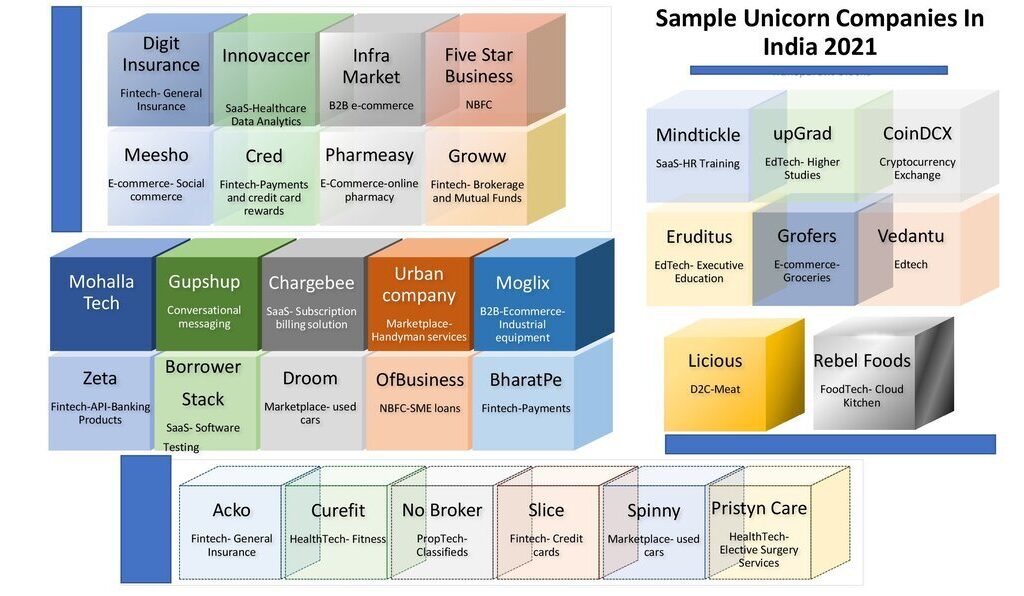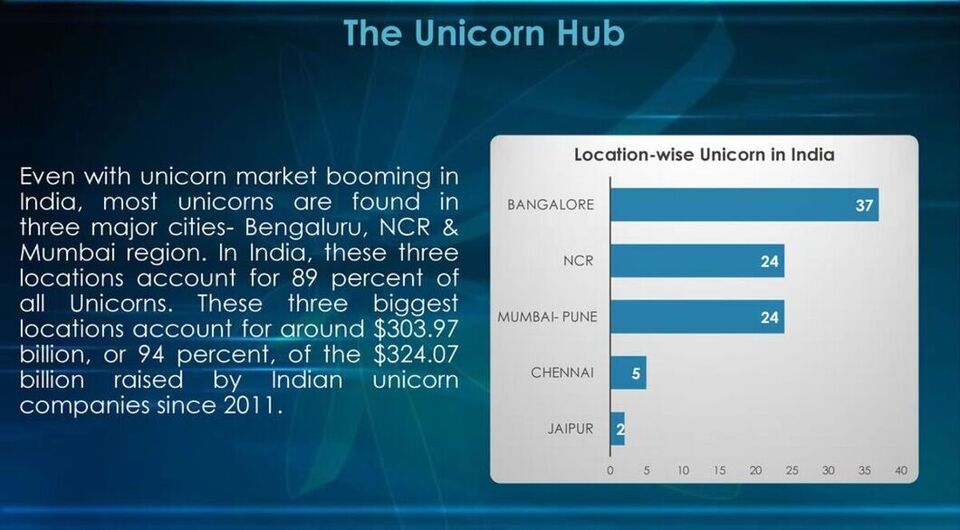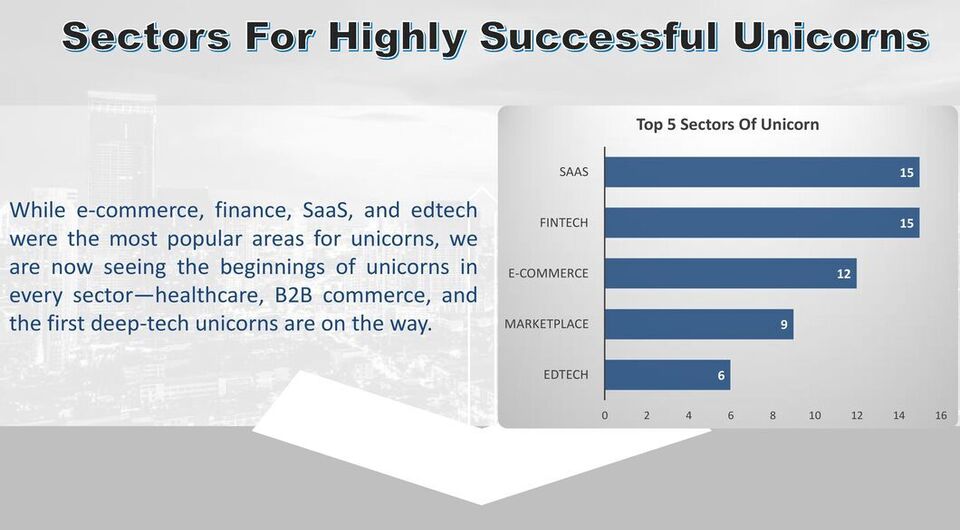
Unicorns In India Are Sprinting To Make An International Impact
A unicorn is a privately held start-up with a market capitalization of more than $1 billion. There are 1,000 unicorns in the world as of March 2022. India has risen to become the world’s 3rd largest startup ecosystem. In today’s fast-paced and dynamic market, Indian unicorns are thriving. Not only is the Indian startup ecosystem expanding, but it is also setting and breaking new benchmarks.
| Table of contents |
| Indian Unicorns Continued Momentum |
| The Unicorn Hub |
| Hot & Potential Future Sectors |
| What led to this surge in funding? |
Indian Unicorns Continued Momentum

In the year 2021, India added 44 new unicorns to its collection. As India keeps up its pace, its 13th unicorn appeared in 2022, a record of the quickest unicorn formation in the nation’s history.
India is still riding the unicorn wave. India will have 100+ unicorns by the end of 2022. Investors are enthusiastic because startups provide a significant amount of innovation and problem-solving potential to the Indian ecosystem.
The Unicorn Hub
The Centre plays a pivotal role in fostering a positive startup culture in India. Startups and Unicorns in India are very well supported by the government. Prime Minister Narendra Modi’s government has launched and backed Startup India. The Startup India project aims to create a strong ecosystem that supports the growth of companies in India. Its goal is to enable entrepreneurs to grow by leveraging innovation and technology. Many incentives are offered to entrepreneurs who start businesses in India to boost growth and support the economy.

Bengaluru
The state government of Karnataka has announced seed investment of up to Rs 50 lakh for 200 companies.
New Delhi
The Delhi government will establish an “incubation center” to foster the startup ecosystem and connect innovators with banks and investors in order to raise funds for their new businesses.
Mumbai
The Maharashtra Virtual Incubation Centre was established by the state to provide value-added services to startups across Maharashtra, including legal, financial, IP, cloud, and mentorship.
Hot and Potential Future Sectors
Tech-driven start-ups are changing the rules of business aggregation across a variety of industries. It’s a win for everyone involved in the market, and it heralds the start of India’s leading technology sector.
EVs and the ecosystem that supports them can alone create a few dozen unicorns in the near future.
Based on statistics since 2011, the top five sectors or industries that have made the list of Unicorns are as follows. These businesses have developed at an exponential rate, not because of the pandemic, but because of it.

What led to this surge in funding?

Evolving Consumer Behavior & the marketplace
The influence of COVID-19 on customers around the world has had a significant impact on both their behavior and demand. Many of these shifts—for example, the remarkable increase in online buying in the last year and shifts in brand loyalty—have occurred in recent years. The percentage of first-time users has risen dramatically, and online platforms are broadening their use-cases to attract new customers. The digital revolution is playing a large role in this because consumers use technology for work, information, health, and socializing. Because the majority of these unicorns are tech-enabled, they are classified as Healthtech, Edtech, Fintech, and a variety of other sectors in addition to the pure-play core industries.

Newmarket opportunities
As customers sought new solutions, new market opportunities for enterprises and organizations arose. Startups have an edge since they are agile enough to respond swiftly to changing market conditions. When it comes to introducing new products and services to the market, these firms are frequently able to meet tight deadlines. Many startups have resorted to the epidemic by releasing goods and services that are directly related to health and safety. As the market for technology investment grew stronger, most of the focus was on digital services.

Suitable demographic profile in India
Due to attractive demographics and a substantial development opportunity across categories, investors’ interest in India’s digital economy has expanded. This is indicated by a surge of private investment into the unlisted market, as well as a reduction in the ability of online startups to attract public financing through initial public offerings (IPOs).

Entrepreneurship, Valuation, and Funding
Every business venture begins with a challenge. When there is a slowdown, a pandemic, a natural disaster, or some type of system-level problem or disruption, you can count on the entrepreneurial sector to bounce back. During challenging times, small businesses are often more effective at generating consumer trust. Investors are drawn to these ideas based on the attractiveness of the idea, reasonableness of the business plan, expertise of the promoters, and the market size assessment.

Edtech and electric vehicles are well-positioned
The trend of online learning has transformed education from kindergarten through college. New solutions to meet the needs of online learners are highly required. New approaches are being developed to meet the demands of students and teachers while also boosting online learning.
To solve environmental concerns in the near future, an electric vehicle is seen as a possible substitute for current-generation automobiles. The government is putting more focus on private-public cooperation to improve the country’s EV ecosystem. Electric vehicle makers and buyers in India have benefited from tax breaks and subsidies. Rising government initiatives are predicted to boost demand in the industry during the next two decades as a result of the very healthy trends.
Conclusion
To compete successfully, companies must have a high level of innovation, a large domestic market to source talent, and an ability to sell domestically. Being a unicorn is difficult, but not impossible. The average time for a startup to mature into a unicorns in India is seven years.
In order to position yourself as a unicorn, you must raise a lot of capital, grow extremely fast, and meet an ever-growing array of metrics.
GeopFX’s startup consulting services help create new businesses enter new markets, and monetize breakthrough ideas. We assist entrepreneurs, innovators, startups, and incubators at every stage of their journey to become world leaders.
Are you on a path to becoming the next unicorn? Or whether you are aspiring to become one? Well, you can.
Share your story with us and leave your comments below.


